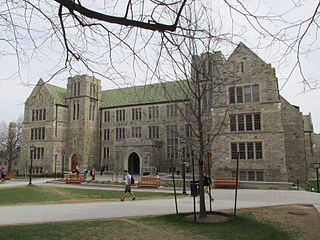The Walter A. Haas School of Business is the business school of the University of California, Berkeley, a public research university in Berkeley, California. It was the first business school at a public university in the United States.

Pitzer College is a private liberal arts college in Claremont, California. One of the Claremont Colleges, the college has a curricular emphasis on the social sciences, behavioral sciences, international programs, and media studies. Pitzer is known for its social justice culture and experimental pedagogical approach.

Claremont McKenna College (CMC) is a private liberal arts college in Claremont, California. It has a curricular emphasis on government, economics, public affairs, finance, and international relations. CMC is a member of the Claremont Colleges consortium.

The Claremont Graduate University (CGU) is a private, all-graduate research university in Claremont, California. Founded in 1925, CGU is a member of the Claremont Colleges consortium which includes five undergraduate and two graduate institutions of higher education.

The Yale School of Management is the graduate business school of Yale University, a private research university in New Haven, Connecticut. The school awards the Master of Business Administration (MBA), MBA for Executives (EMBA), Master of Advanced Management (MAM), Master's Degree in Systemic Risk (SR), Master's Degree in Global Business & Society (GBS), Master's Degree in Asset Management (AM), and Ph.D. degrees, as well as joint degrees with nine other graduate programs at Yale University.
Business education is a branch of education that involves teaching the skills and operations of the business industry. This field of education occurs at multiple levels, including secondary and higher education

The Robert Emmett McDonough School of Business, commonly shorted to the McDonough School of Business and abbreviated as the MSB, is the business school of Georgetown University in Washington, D.C. Founded in 1957, it grants both undergraduate and graduate degrees, and is one of the university's nine constituent schools. Since 1998, the school has been named in honor of Georgetown alumnus Robert Emmett McDonough.
The Weatherhead School of Management is a private business school of Case Western Reserve University located in Cleveland, Ohio. Weatherhead offers programs concentrated in sustainability, design innovation, healthcare, organizational behavior, global entrepreneurship, and executive education. The school is named for benefactor and Weatherchem owner Albert J. Weatherhead III, and its principal facility is the Peter B. Lewis Building.

University of Economics in Katowice is a public higher education institution in Katowice, Poland.

The Wallace E. Carroll School of Management (CSOM) is the business school of Boston College in Chestnut Hill, Massachusetts.
The School of Accounting and Finance (SAF) at University of Waterloo is a professional school within the Faculty of Arts. The School was established in 1980 under the name 'School of Accountancy'. Its name was changed in 2008 to better reflect its program offering. Today, more than 1,600 students are enrolled in the School's programs. In September 2009, a new 52,000 square feet (5,000 m2) building was officially opened to house the School.
The Penn State Smeal College of Business at the Pennsylvania State University offers undergraduate, graduate, and executive education programs to more than 6,000 students. Accredited by the Association to Advance Collegiate Schools of Business (AACSB), Smeal, is home to more than 150 faculty members who teach and conduct academic research on a range of business topics. The college also features a network of industry-supported research centers.
KIMEP University is a private university founded in 1992 in Almaty, Kazakhstan.

The Olin Business School is the business school and one of seven academic schools at Washington University in St. Louis. The school offers undergraduate, master's, doctoral, and executive programs.

The Wake Forest University School of Business is the business school of Wake Forest University in Winston-Salem, North Carolina. It offers management-related masters programs and executive education programs, as well as undergraduate program to around 1,314 students. The school is SACSCOC, AACSB, and AACSB-Accounting accredited. It has a second campus in Charlotte, North Carolina.
The Guanghua School of Management, Peking University (北京大学光华管理学院) is the business school of Peking University, a public university in Beijing, China.

The University of Western Australia Business School is a business school at the University of Western Australia (UWA). UWA first began teaching Economics in 1912, and the Business School is now home to over 4,929 students. The school has four disciplines: Accounting and Finance; Economics; Management and Organisations; and Marketing.

The Jon M. Huntsman School of Business is located at Utah State University in Logan, Utah.
The Tepper School of Business is the business school of Carnegie Mellon University. It is located in the university's 140-acre (0.57 km2) campus in Pittsburgh, Pennsylvania.
The Tasmanian School of Business and Economics (TSBE), formerly known as the Faculty of Business, was founded in 1890 and first offered degrees in Economics and is the business and economics school of the University of Tasmania. It offers the undergraduate Bachelor of Business and Bachelor of Economics degrees, as well as postgraduate degrees and a Master of Business Administration program. The School is also associated with the Australian Innovation Research Centre, as well as the Australian Institute of Health Service Management.











